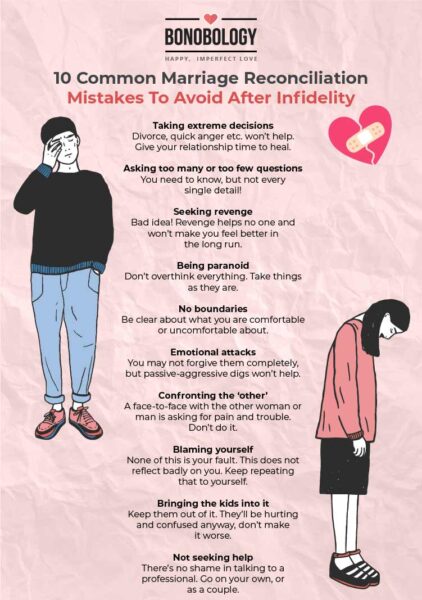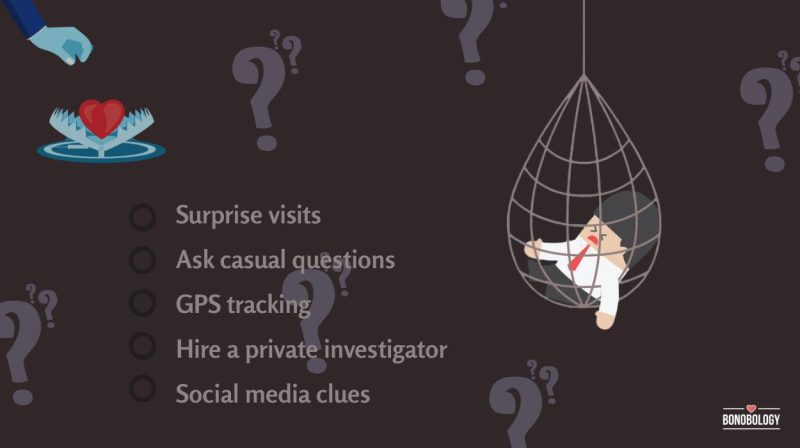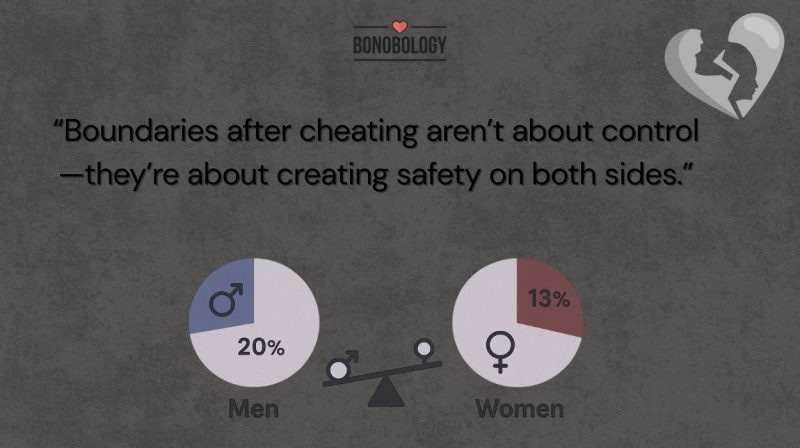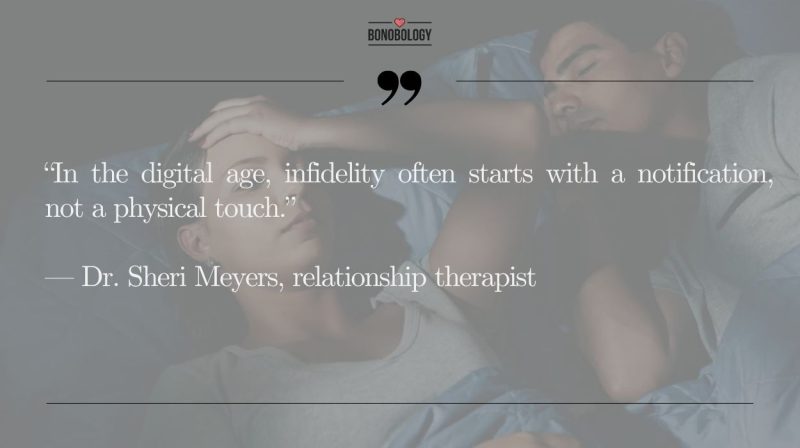In an ideal world, no one would put up with the disrespect and pain of being cheated on (but then, in an ideal world, the person you loved and trusted the most in this world, won’t go cheating on you). However, real life and human relationships are often messy, and walking out on a cheating spouse may not always be an option. If you do decide to give your relationship another go, do it with complete awareness of the 10 common marriage reconciliation mistakes to avoid after infidelity.
Why, you ask? For one, reconciling the right way can minimize the risk of reliving the trauma of being cheated on a few years down the line. Secondly, it makes sure that you identify, address, and work through whatever issues contributed to your partner’s choice to stray and rebuild a stronger bond rather than just sweep your issues under the carpet and settle for a hollow shell of a relationship that is ready to crumble at the first hint of trouble.
Deciding to forgive a cheating partner and give them another chance is not the hard part. The real challenge starts thereafter. It is almost like beginning a new relationship, albeit with caution and the baggage of hurt and mistrust. To make the path easier, let’s take a look at 10 common marriage reconciliation mistakes to avoid after infidelity to improve your odds of resting this fresh start on a solid foundation, in consultation with psychologist Nandita Rambhia (MSc, Psychology), who specializes in CBT, REBT and couples counseling.
Is Reconciliation After Infidelity Possible?
Table of Contents
Is reconciling after infidelity possible? Is it possible to save a marriage after infidelity? My husband cheated, should I stay? My wife wants to come back after affair, should I give her another chance? Questions like these often plague the minds of people whose partners have been caught cheating. The short answer is: yes.
It’s possible to restore marriage after adultery and build a healthy relationship but the process can be emotionally taxing and requires effort and hard work from both partners. For surviving an affair, the partner who has been cheated on needs to practice forgiveness while the cheating spouse must accept responsibility for their mistakes and apologize. The infidelity recovery process requires a lot of humility, effort, honest communication, and patience.
Speaking about whether reconciliation after infidelity is possible, Nandita says, “When a couple begins the marital reconciliation process in the wake of infidelity, there are a lot of mental blocks that get in the way of their emotional bond, connection with one another, and sexual intimacy. The extent to which these mental blocks impact reconciliation depends on the nature of the infidelity as well as how strong their bond was before the cheating happened and came to light.”
Here are some things that can aid the healing process and help restore marriage after adultery:
- Practice empathy and follow up on their promises with actions
- Set boundaries and stop taking each other for granted
- Practice vulnerability
- Ask relevant questions after infidelity
- Learn to feel weak and emotional in front of your spouse
- Express your doubts and fears with regards to your marriage
- Learn to communicate your feelings to one another
There are several reasons not to divorce after infidelity. These can range from still being in love with each other to financial limitations, societal pressures and stigma, not wanting to break up a family, or staying together for the sake of the kids. The odds of you succeeding at figuring out how to make a marriage work after cheating depend on the reasons why you’re choosing to reconcile in the first place as well as the nature of the transgression.
For instance, if cheating was a one-off thing, getting over infidelity can be easier as compared to forgiving a long-term extramarital affair. Likewise, if you still truly love one another and are willing to put in the hard work to build a healthy relationship, then reconciliation after cheating becomes somewhat easier. A lot of people make the choice of staying together after cheating, however, the quality of the relationship depends on whether or not you’re doing it for the right reasons and in the right way.
Related Reading: 10 Questions To Ask Your Unfaithful Spouse
10 Common Marriage Reconciliation Mistakes To Avoid After Infidelity
“Three years ago, when I told Janine I was having an affair, she didn’t want to hear anything I had to say and wanted to walk out. Initially, she was so shell-shocked that the only communication she had with me was hurling abuses and divorce papers my way,” says Jon, a 34-year-old chiropractor, sharing his experience of reconciliation after infidelity separation.
“I had no idea how to help my wife heal after I cheated. After a month of separation, she was not averse to having a conversation with me again. One emotional conversation led to another, and just like that, the stages of reconciliation after an affair began unfolding,” he adds.
Given the impact of infidelity on the betrayed spouse, this behavior is not unexpected. Nandita says, “Soon after an affair is discovered, the betrayed spouse may stop feeling anything for the other. Falling out of love after infidelity is not uncommon. However, this loss of feelings is not necessarily permanent. Over time, the strong emotions begin to settle down. If a couple’s bond was strong before this setback, they can find a way back to each other.”
However, this doesn’t mean that you can just erase this chapter from your life and move forward. It’s a long, hard road to recovery. But can be made easier if you stay mindful of these 10 common marriage reconciliation mistakes to avoid after infidelity:

1. Making extreme decisions hastily
When you discover you have been cheated upon, it is natural to go through emotional turmoil. “Emotions run high after infidelity comes to light and the betrayed spouse may feel overwhelmed by anger, betrayal, and trust issues, which makes it difficult for them to be empathetic toward their cheating partner,” says Nandita.
You might be tempted to act impulsively in the heat of the moment, like serving a divorce notice or having an affair yourself, or throwing your spouse out of the house. These are among the biggest mistakes in marriage reconciliation that make the road to reconnecting with your spouse that much harder. To be able to understand how to make a marriage work after cheating, you need to not let your emotions drive your actions.
Avoid making decisions hastily. Give yourself and your relationship time to heal and remember there are several stages of healing after infidelity. Give each other some breathing space until you can gauge your feelings correctly and objectively. There is no other way to figure out when to walk away after infidelity and when to stay and give your marriage another chance. Of the 10 common marriage reconciliation mistakes to avoid after infidelity, this one might be the most difficult to put a lid on. But do it you must because it is one of the most crucial stages of forgiving infidelity.
Related Reading: 11 Things You Didn’t Know Amount To Cheating In A Relationship
2. Asking too few or too many questions
Yes, this may sound like a bit of a paradox. But both these are among the most common marriage reconciliation mistakes to avoid after infidelity. You have the right to ask questions about your partner’s affair and you deserve answers. One of the reasons why the betrayed spouse wants details is to gain clarity about what drove the other person to betray their trust. This, in turn, can help them work toward closure in the long run.
Remaining in denial, pretending that the cheating didn’t happen, or avoiding the hard conversations will only impede your efforts of staying together after cheating. It is important to communicate during the process of reconciliation after cheating. As the spouse who has been cheated on, you may be so overwhelmed by your pain and misery that you may not even spare a thought about how cheaters feel about themselves. Asking the right questions can bridge that gap and make space for empathy in your connection.
“There will be times when the betrayed partner will want to know everything about the affair and there will be phases where they’d not want to hear a thing about what went down and how. Both these responses are natural and can appear in tandem. However, it is essential to be able to strike a balance and seek information on a need-to-know basis. Accept that you may never come to know or handle the whole truth about your spouse’s extramarital affair,” says Nandita. Spare yourself the agony of going into intimate details of your spouse’s connection with their affair partner.
3. Seeking revenge
Most relationship experts say that a person goes through four to six infidelity recovery stages through after discovering they have been cheated on – grief, denial, anger, and bargaining, to name a few. It’s only after you’ve been through this emotional wringer that you get to the point of acceptance and can even begin to think about recovering from betrayal in marriage and reconnecting with your spouse.
While each stage is difficult and has its own set of challenges, anger can be the most precarious. For making it work after cheating, you must take conscious steps to stop yourself from going down the rabbit hole of taking revenge on your partner in the heat of the moment. You may think about having an affair yourself to teach your partner a lesson but know that such thoughts are self-destructive. You will only end up hurting yourself.
“There will come a stage where you’d feel that you can’t stand the hurt and the pain anymore and you’d want to do something about it. Make sure that you choose a path that takes you a step closer to accepting that infidelity happened and deciding where you want to go from there, and not go down the road of revenge that will only contribute to the negativity, stall your healing process, and render you unable to move forward,” advises Nandita. This can be one of the biggest mistakes that get in the way of restoring marriage after affair.
Related Reading: What Is Revenge Cheating? 7 Things To Know
4. Being paranoid that they will cheat again
When you’re trying to figure out how to overcome infidelity in marriage, moving past trust issues can be the biggest stumbling block in your path. However, you have to find a way to rebuild trust in the relationship. One of the 10 most common reconciliation mistakes to avoid after infidelity is to be overly suspicious of your partner. If you want to forgive your spouse and move forward together as a couple, do it wholeheartedly or don’t do it at all.
Your paranoia about the possibility of them cheating again is going to lead you both nowhere. If they have to cheat, they will. So stop looking through their phones, peeking through their stuff, or spying on them. Your doubts and fears are valid but acting paranoid will only deteriorate the situation. You should set boundaries to prevent emotional affairs or even physical ones, but those rules are to protect you, not to wreck whatever chances you have at happiness.
5. Failure to set boundaries
While we are on the subject, know that a failure to set boundaries ranks high in the top 10 reconciliation mistakes to avoid after cheating. When you decide to take back an adulterous spouse, set the terms and conditions clearly. Nandita advises, “Boundaries are integral to the marriage reconciliation process. So, sit with your partner and set relationship boundaries. More importantly, honor them, no matter what. If either partner, especially the one who cheated, oversteps these boundaries, it can stir up insecurities and trust issues all over again.”
Boundaries in the relationship can look something like this:
- When you flirt with others, it makes me feel disrespected. I expect you not to do it anymore
- If you’re running late, I expect to be informed
- I’d appreciate it if you can keep me apprised of your whereabouts during the day
- While I promise not to snoop on your phone, I’d like us to share passwords for sake of transparency
Communicate your needs and fears frankly. Read the riot act before you get back together to succeed at getting over infidelity in marriage. But once you do, learn to trust and not be suspicious of your partner at every turn. If your inherent fears and insecurities are getting in the way of your ability to trust your spouse, and you find yourself asking, “Is a marriage never the same after infidelity?” or “Can a relationship recover after cheating?”, know that it takes time. But when you do get there, you will have crossed a major milestone in the infidelity recovery stages.
Related Reading: Why A Cheating Person Shows No Remorse – 17 Astonishing Reasons
6. Attacking your spouse emotionally
Agreed, staying in a marriage that is teetering on the edge is hard, but remember, it’s you who has decided to reconcile. If you truly want to figure out how to overcome infidelity in marriage, one of the most helpful tips we have for you is to steer clear of emotional attacks. This does not mean that you can’t bring up the issues that are bothering you or share your fears and apprehensions, but you must do it in a respectful and caring way.
Not knowing what to say to someone who has hurt you and how to say it is one of the most common reconciliation mistakes to avoid after infidelity. Even if you haven’t gotten over the pain your spouse caused you, lashing out, hurling barbs and jibes, posting cryptic social media messages, giving them the silent treatment, and shooting passive-aggressive digs to make them feel worse won’t help you heal.
If you keep berating your partner every chance you get, you won’t succeed at rebuilding a marriage after adultery. They may even be discouraged from telling you things in the future, which will only damage your relationship further. If you still can’t get past your spouse’s transgression, talk to them and seek a solution but do not try these below-the-belt tactics that cause nothing but stress. Avoid them at all costs if you want to save a marriage after infidelity.

7. Confronting the person they cheated with
Should you confront the other woman or man? This dilemma is one of the most challenging aspects of figuring out how to overcome infidelity in marriage. It might be very tempting to ask your spouse’s affair partner about their relationship or you may want to flaunt how you “won” your partner back. But other than satisfying your ego, it is not going to serve any purpose. In fact, it may just worsen things since the possibility of the encounter turning ugly is so high.
Seeking closure is one of the important stages of healing after infidelity but you won’t get it from an ugly confrontation with your spouse’s affair partner. Unless it is absolutely unavoidable – for instance, if the person your spouse cheated with is someone you know and have to interact with frequently – this showdown is best avoided. Remember you’re trying to build a new relationship with your spouse, and this confrontation can undo any progress you may have made so far.
8. Blaming yourself and feeling guilty
One of the common effects of being cheated on is the tendency to blame yourself and feel guilty about whatever happened. Whether your partner had an emotional affair or a physical one, whether it was a long-term affair or a fleeting fling, it’s bound to dent your self-esteem. As a result, you may begin to start questioning whether you may have contributed to your wayward spouse’s ways in some way or if you weren’t good enough them.
Irrespective of whether the affair was the result of a marital discord or poor sex life, do not let your spouse, yourself, or anyone else gaslight you into believing it was your fault. Always remember, no matter what the circumstances, cheating is always a choice and it’s a choice that your partner made, not you. The stages of reconciliation after an affair do NOT include your partner portraying you as the bad guy and themselves as the victim.
“The partner who has cheated needs to take responsibility for their actions, own up to their mistake, and show the will put in the hard work toward making things better. In the absence of this accountability, marital reconciliation can become an insurmountable challenge,” says Nandita. While it is all right to introspect and look at your part in weakening your relationship, do not let it affect your sense of self.
Related Reading: How To Break The Vicious Betrayed Spouse Cycle
9. Bringing the children into the drama
Infidelity can be tough on everyone but never make the mistake of dragging children into your marital problems. Sometimes, when an affair is exposed and you are unwilling to let go of your spouse, it can be tempting to use children as pawns to guilt your partner into staying. Punishing an unfaithful partner by denying them access to the kids or threatening to shame them in front of the family is also not unheard of. However, these are not the answers to how to rekindle a relationship after cheating.
These manipulative acts point to an intention of taking revenge, not rebuilding the relationship. Your partner should want to stay with you because they truly regret cheating and are willing to make amends, not out of guilt or to protect the children from getting hurt. Not knowing when to walk away after infidelity and guilt-tripping your partner into staying in a relationship they are no longer invested in is one of the most common marriage reconciliation mistakes.
Such a broken, incomplete relationship can never be the basis of a happy family. No to mention the emotional trauma suffered by the children who are being used as bait. If you need a third party to break the ice or mediate, involve friends or family members you can trust. But leave the kids out of it.
10. Not seeking help when you need it
Recovering from an affair and rebuilding trust and intimacy after adultery is not easy. If you and your partner feel stuck or the infidelity recovery process has hit a snag, seek professional help. Marriage counseling can help you make sense of your emotions, ensure that you’re on the same page about what you want from the relationship, as well as identify the underlying issues that may have facilitated this transgression and work through them.
Taking care of your emotional needs and well-being during this difficult time is crucial. Depending on the nature of the affair – whether it was a one-night stand or a long-term emotional affair – your cheating partner too would have their own share of struggles. Remember that you are at a vulnerable stage and any missteps can deal a lethal blow to your relationship.
“When communication seems impossible or the hurt and betrayal color all your interactions with one another, couples therapy can be immensely helpful in making you see things in a new light and understand each other’s perspective,” says Nandita. If you’re looking for help figuring out how to reconcile after infidelity, Bonobology’s panel of experienced therapists is here for you.

Key Pointers
- Infidelity is a huge setback for any relationship but it is possible to recover from it and reconcile
- The decision to walk away or give your relationship another chance shouldn’t be made when you’re still processing the emotional turmoil of being cheated on
- If you do decide to reconcile, avoid mistakes such as being overly suspicious, not setting boundaries, resorting to emotional attacks, seeking revenge, or blaming yourself for your partner’s actions
- Seeking professional help can be immensely helpful for a married couple trying to reconcile after infidelity
They say relationships are like glass that, once broken, will always show a crack. While that’s true, we have one word for you: Kintsugi (for the uninitiated, it is the Japanese art form of mending broken pottery pieces with gold — also used as a metaphor for embracing flaws and imperfections). That’s to say, you can move past a setback as shattering as infidelity and emerge a lot stronger than before.
FAQs
Being cheated upon can change a person in many ways. Firstly, they find it difficult to trust after being betrayed by a partner. You might find it challenging to rebuild trust in your partner or any other person again. You may not even want to reconcile after cheating. It might also result in low self-esteem and self-worth issues.
You can’t generalize the whole ‘once a cheater, always a cheater’ concept. It depends on the personal values of an individual, the circumstances under which they slipped, and the nature of their current relationship.
Being cheated on hurts because it shatters your core belief and trust in a person. You feel let down by someone you love dearly and that causes more hurt than anything else. You also feel bad about being taken for a ride emotionally.
There are many stages of forgiving infidelity. Time will eventually heal the pain, but it will take patience, effort, and professional help. It’s also possible that certain scars will always remain, and it’s up to both of you to cope with them gently.
13 Positive Signs During Separation That Indicate Reconciliation
Your contribution does not constitute a charitable donation. It will allow Bonobology to continue bringing you new and up-to-date information in our pursuit of helping anyone in the world to learn how to do anything.






















